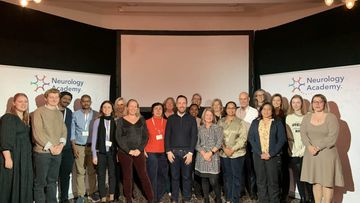Are the ‘Forgotten Many’ forgotten again? NICE rejects Novartis’ Mayzent for SPMS
Before we, as the MS Academy, respond to NICE it is important we do a short survey to find out what the situation is on the ground and see if there is any consensus in our practice. We would appreciate it if you spend 2 to 4 minutes completing the following survey.
The National Institute for Health and Care Excellence (NICE) has not recommended siponimod to treat patients who have secondary progressive multiple sclerosis (SPMS) despite expectations that the drug would soon be available on the NHS in the UK.
NICE has published draft guidance which does not recommend the disease-modifying treatment (DMT) siponimod (Mayzent), within its marketing authorisation, for treating SPMS with evidence of active disease (that is, relapses or imaging features of inflammatory activity) in adults.
Clinical trial results show that siponimod reduces the number of relapses and slows disability progression compared with placebo. However, it is uncertain how effective siponimod is compared with interferon beta-1b because there is no evidence directly comparing them.
NICE says that due to the limited clinical evidence, the cost-effectiveness estimates are uncertain, and none of the analyses reflect the committee’s preferred assumption that it cannot be recommended.
The committee has requested further analyses to be included in the company’s economic model. These include comparing siponimod with best supportive care and assuming that there is a reduction in its treatment effect over time.
‘It is very disappointing that NICE has not recommended Siponimod for treating active SPMS under the NHS. This will come as a big disappointment for patients with active SPMS who were hoping to be started on or switched to Siponimod’,
said Gavin Giovannoni, Professor of Neurology at Barts and the London, and Academic Director of MS Academy.
‘It is clear that some of the assumptions NICE have made about the treatment of MS don’t represent the reality on the ground, in particular, that most people diagnosed with SPMS do not have any disease-modifying treatment.
I would argue that the biggest population of potential ‘siponimod-eligible’ patients with SPMS are those smouldering away on existing disease-modifying therapies. MSologits are reluctant to label their patients as having SPMS because of the implications it has for treatment and most neurologists don’t necessarily stop existing DMTs in patients with worsening disability because they are concerned about the potential for a rebound inflammatory disease activity.
The MS Academy will need to respond to NICE and make them aware of these facts. We have a responsibility to be advocates for our patients. Siponimod is not just another anti-inflammatory agent. It has been shown to preserve or slow down the loss of cognitive function in subjects with SPMS, which is something worth fighting for on behalf of our patients with more advanced multiple sclerosis. Patients with SPMS need hope; not having Siponimod as a treatment option deprives them of that hope.’
Dr David Paling, consultant neurologist and MS Academy faculty member, shared this same disappointment, adding, ‘This news will come as a huge blow for people with secondary progressive MS, their families and carers, who had been rightly hopeful that this medication may help to reduce the speed at which they would become more disabled.
We would urge NICE to review some of the evidence used to make this conclusion.’
Dr Paling clarified that ‘In assessing the cost effectiveness of Siponimod, the NICE appraisers made a comparison with beta interferon, the only other disease-modifying therapy that is licenced for use in SPMS. We do not feel that this is a useful comparison for the UK, since only 75 people in the UK specifically are on beta interferon for SPMS. In concentrating on this comparison we believe that NICE may have underestimated the cost-effectiveness of the treatment in the UK setting.
In reality most people with SPMS are being prescribed another DMT and, whilst they are relapse-free, are slowly becoming more disabled. Siponimod offers an alternative DMT for these people with MS, and is able both to prevent relapses, and to prevent the accumulation of disability independent of relapses. An accurate assessment of siponimod's cost-effectiveness would be to compare its additional effects in reducing disability accumulation in these patients at an early stage of transition when compared to existing disease modifying therapies.
The assessment also only looked specifically at physical disability. However, there is also clear evidence that siponimod prevents worsening of cognition. People with MS are equally concerned about worsening of their cognition as they are about changes in their physical function, and cognitive disability is independently associated with loss of employment (1) and health-related quality of life (2).
We will forward these concerns to NICE, and hope that they will take these concerns into account when making their final decision.’
References
- Coyne KS, Boscoe AN, Currie BM, Landrian AS, Wandstrat TL. Understanding Drivers of Employment Changes in a Multiple Sclerosis Population. Int J MS Care. 2015;17(5):245-252. doi:10.7224/1537-2073.2014-051
- Hoogs M, Kaur S, Smerbeck A, Weinstock-Guttman B, Benedict RH. Cognition and physical disability in predicting health-related quality of life in multiple sclerosis. Int J MS Care. 2011;13(2):57-63. doi:10.7224/1537-2073-13.2.57
Related articles
Encouraging excellence, developing leaders, inspiring change
MS Academy was established five years ago and in that time has accomplished a huge amount. The six different levels of specialist MS training are dedicated to case-based learning and practical application of cutting edge research. Home to national programme Raising the Bar and the fantastic workstream content it is producing, this is an exciting Academy to belong to.


